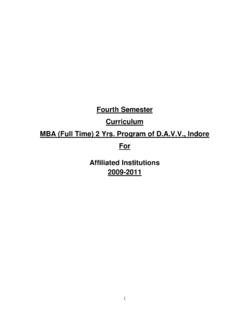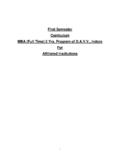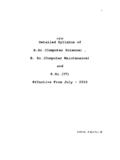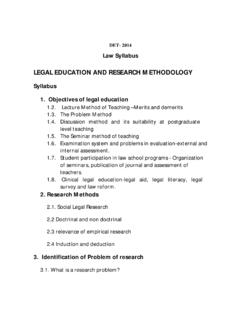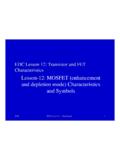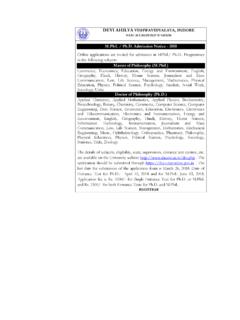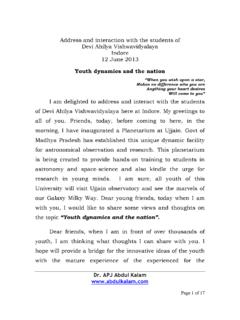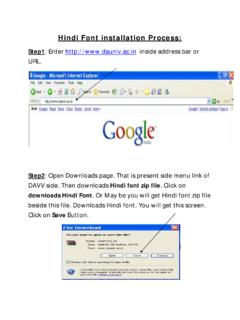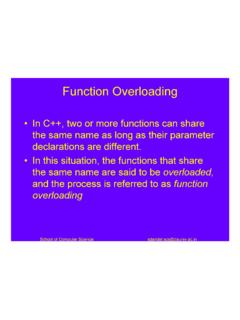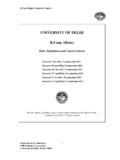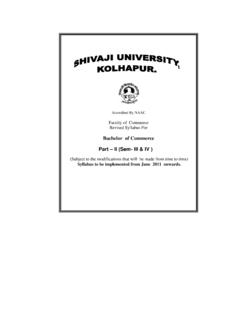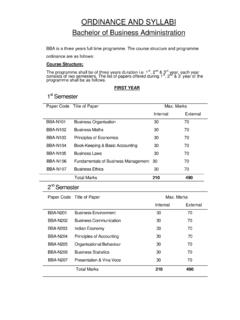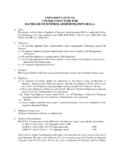Transcription of I , II, III & IV Semesters 2015-16 Academic Year and …
1 RANI DURGAVATI VISHWAVIDYALAYA, JABALPUR. Syllabus for BACHELOR OF EDUCATION. Two year DEGREE COURSE. I , II, III & IV Semesters 2015 -16 Academic year and Onwards RANI DURGAVATI VISHWAVIDYALAYA, JABALPUR. Syllabus & Course Structure For BACHELOR OF EDUCATION ( ). COURSE STRUCTURE: Course Scheme of Examination semester Scheme semester I. Course/Paper Hours Total Internal External per marks (Formative) (Summative). week Group A: Core Course CC 1: Childhood & 6 100 25 75. Growing Up CC 2. Education in 6 100 25 75. India- Status, Problems and Issues CC 3. Language 4 50 15 35. across the curriculum Part 1. CC 4. Curriculum 100 25 75. Development &. School 6. EPC 1 Reading and 2 50 20 30. Reflecting on Texts Total 400 110 290. Note: Assignments & Tasks for Courses 1,2,3,4.
2 Second semester Course/Paper Hours Total Internal External per marks (Formative) (Summative). week Group B: Core Course CC 1: Learning & 6 100 25 75. Teaching 2. PC (I) Pedagogy of a 6 100 25 75. School Subject Part 1. (Subject: 1 Science . Biology /Maths/Social Sciences (SS)/Language- Hindi/. English/. Urdu/Sanskrit/other Region-specific lang.). 3. PC (II) Pedagogy of a 6 100 25 75. School (Part II): Subject Knowledge and the Related Pedagogic Dimensions (Subject: 1. Science . Chemistry /Physics /History/ Civics/. Geography/Economics/. Commerce). 4. Language across the 4 50 15 35. curriculum- Part -2. EPC 2 Drama & Art in 2 50 20 30. Education Total 400 110 290. Note: 1. Assignments & Tasks for Courses 1,2,3,4. Third semester Course/Paper Hours per Total Internal External week marks (Formative) (Summative).
3 Group A: Core Course CC 1: Pedagogy of a 50 15 35. School Subject (Part II): 2. School Internship 350 150 200. 3. EPC 1- Educational 50 10 40. Psychology Practical Tatal 450 175 275. Note: 1. Twenty Weeks (Four Weeks) Practice Teaching & (Sixteen Weeks) Internship school INTERNSHIP IN TEACHING. The activities and the allotment of marks for internship in teaching in each method of teaching school subjects are as following Sem. III. Particulars Marks 1 Micro Teaching under Simulated conditions (Eight Skills) (16*3) =. 48. 2 Lesson Planning(practice Teaching) 100. 3 Execution of the lesson in the actual class room 100. Situation& School Work 4 Unit Plan 40. 5 Unit Test Administration Evaluation and interpretation 40. 6 Resource unit/instructional kit/workbook/working models.
4 12. 7 Observation records 10. Total 350. Fourth semester Course/Paper Hours per Total Internal External week marks (Formative) (Summative). Group B: Core Course CC 1: Gender, School & 6 100 25 75. Society 2. Educational 6 100 25 75. Technology & ICT. 3. Creating an 6 100 25 75. Inclusive School 4. Optional Course: 6 100 25 75. (Any One of the Subject mentioned below). a. Value Education b. Futurology in Education c. Health and Physical Education d. Guidance and Counseling in School e. Environmental Education f. Action Research EPC 3 : 50 20 30. Understanding the Self 2. EPC 4 : 50 20 30. Understanding of ICT 2. 500 140 360. Note: Assignments & Tasks for Courses 1,2,3,4. Eligibility to take the Examination a. A candidate shall appear at the final examination if he/she satisfactorily completes, besides fulfilling all other conditions under regulation of this syllabus.
5 Guidelines for Internal Assessment: 1 The college shall submit to the University all the internal assessment marks pertaining to theory and practicum as detailed in above to the University a week before the commencement of the theory examination along with CD in the format supplied by the University. 2 The Registrar (Evaluation) shall arrange for scrutiny of internal marks by constituting a committee of 2-3 members. The committee shall ascertain IA marks in the light of guidelines. The Registrar (Evaluation) shall call for all the IA related records of any Affiliated College without any prior intimation or the screening committee may visit any college at any time during the office hours without any intimation; and during such surprise visit, the screening committee shall verify the IA records.
6 3 The individual colleges shall also submit the required descriptive statistics , Frequency distribution, Mean, for (i)Total Internal Assessment (ii) Individual papers and (iii) Internship in Teaching as directed by the Registrar(Evaluation). 4 The Principal of the college shall submit a fair copy of the moderated consolidated marks lists incorporating the directions of the Registrar (Evaluation). 5 In the instance of any malpractice coming to the knowledge of the Registrar (Evaluation) the matter will be seriously viewed by the University for appropriate action. 6 The decision of the University shall be final. Scheme of Examination: 1 There shall be a University Examination at the end of each semester . 2 Scheme of studies and examination of the Course (vide Annexure 1).
7 3 The External and internal assessment for each Theory and MOT paper shall be 75 and 25. marks respectively. Theory Examination Question Paper Pattern Pattern of all Question Papers for papers (duration of examination-3 hrs). No. of questions to be Marks per Total Section Nature of objectives to be covered answered question marks A 11 Questions out of 14 Knowledge / Understanding /. questions to be 5 55 Comprehension type questions. Each answered should answered in not more than one Page (100-150). Words). B 2 Questions 10 20 Application, Analysis, Synthesis, out of 4 question to be answered Evaluation type questions Each should be answered in about 2 to 3 pages (400-500 Words). Total 75. Note : 1. All units in a given subject/paper should be adequately represented in the question paper.
8 2. Due weightage in terms of marks should be given to each unit. Internal Assessment: A. The Internal Assessment marks of the theory papers are as follows. Particulars Marks 1. Attendance 5 Marks st 2. 1 Test 5 Marks nd 3. 2 Test 5 Marks 4. Assignment 10 Marks Total 25 Marks Attendance Marks Split-up Attendance 90 and Above 80 Above 75 70 and (in percentage) above to 90 to 80 below Marks 5 4 3 No Marks Community Orientation Grades a. SUPW. b. PE/Games C. Citizenship Training Camp (CTC). Grades (A= Excellent, B=Good, C= Average). SYLLABUS. Bachelor of Education ( ) Course Compulsory Paper semester I. CC 1: Childhood & Growing Up Objectives: . To develop an understanding of different aspects of a child's physical, motor, social and emotional development. To understand the developmental process of children with diverse abilities in social, cultural and political context.
9 To build sensitivity towards children's developmental needs and capabilities, within their socio-cultural context. To develop a sensitive and critical understanding of the different social/educational/cultural/political realities at the core of the exploration into childhood. To build an interdisciplinary frame work to interpret, analyse observations and interactions from cross culture psychology. To develop critical deconstruction of significant events that media highlights and creates during childhood To provide hands-on experiences to interact with children, and training in methods to understand aspects of the development of children. To develop the power to interpret how gender caste and social class may impact the lived experience of children. CONTENT. Unit 1: Perspectives in Development Concept , Meaning ,Scope and Function and Educational Psychology Introduction to development: concept and introduction to perspectives in development, humanistic psychology and developmental theory Enduring themes in the study of development: development as multidimensional and plural; Development as continuing through the life span; ways in which development is continuous/discontinuous?
10 ; Socio-cultural contexts influencing development Gathering data about children from different contexts: naturalistic observations;. interviews; reflective journals about children; anecdotal records and narratives;. clinical methods with reference to Piaget Method: Longitudinal, Cross Sectional, Sequential, Cohort methods: Biographical, Case study and Observational method. Unit 2: Stages of Human Development Child as a developing individual; a psycho-social entity; stages of development Developmental characteristics of a child and an adolescent: physical, cognitive, social, emotional, moral and language; their interrelationships Developmental tasks of childhood and adolescence and their implications Factors influencing development such as heredity& environment, media, nutrition, child-rearing practices, siblings and peers Commonalities and diversities within the notion of childhood and how multiple childhoods are constructed with particular reference to the Indian context-Living in an urban Slum, Growing girl, and Growing up in dalit household Unit 3: Social and Emotional Development Basic understanding of emotions, how differential gender socialization occurs.
